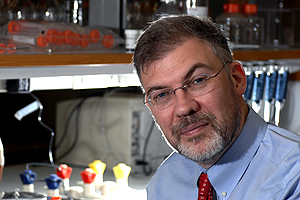![[Chronicle]](/images/sidebar_header_oct06.gif)
Vol. 26 No. 18
current issue
archive / search
contact
Past Opine interviews:
Lauren Berlant
Stephen Berry
John Boyer
David Cohen
Jerry Coyne
John Cunningham
Richard Epstein
John Frederick
Henry Frisch
Austan Goolsbee
Bernard Harcourt
Greg Jackson
Martin Marty
Martha Nussbaum
Raymond Pierrehumbert
José Quintáns
Jan-Marino Ramirez
Saskia Sassen
William Sewell
Herman Sinaiko
Geoffrey Stone
Cass Sunstein
Simon Swordy
Opine: John Cunningham
 John Cunningham (Photo by Dan Dry) | |
This week, John Cunningham, Professor and Section Chief of Hematology/Oncology in Pediatrics, answers the Opine questions, which have been answered by other faculty members since October 2006, when Opine debuted.
What book should every person read and why?
I find it impossible to choose a single book. First, I recommend the extant works of Plato and Aristotle. Not only do they form the basis of western philosophy, but also they continue to help us interpret our world rationally. Second, the plays of William Shakespeare, which address all aspects of the human condition. Third, the essays of Francis Bacon and Edmund Burke, whose insights into the political process remain relevant today. Fourth, the novels of Ernest Hemingway—a writer’s ideal. Finally, the poems of W.B. Yeats and Seamus Heaney, which provide solace at the end of a long day.
If you could meet any scholar, author, composer, musician or entrepreneur—dead or alive—who would it be and why?
I would choose to meet the scholar Gregor Mendel, the father of genetics, who used simple observation to make profound conclusions; the composer Mozart to understand the mind of a true prodigy; the musician Louis Armstrong to hear with my own ears and live the sweet sound; and the entrepreneur John D. Rockefeller for his single-mindedness in business and philanthropy.
Among the complex moral and political issues that affect humanity, which do you believe will never be resolved and why?
The frequently intertwined religious and nationalistic differences that have plagued the world for centuries. We can hope that rational persons of different outlooks can come together to find at least a modest compromise. Unfortunately, such compromise tends to be a fragile patchwork that so frequently dissolves.
If politicians had to pass an exam before they were allowed to serve in public office, what question would you add to the test?
Explain how people with liberal and conservative viewpoints can reach a consensus.
If you could choose any three University professors and give them a one-year sabbatical together to solve a problem, develop a theory or make a discovery, who would they be and what task would you assign them?
I am a fan of investigator-driven discovery rather than focusing on a specific topic. However, developing a national system of healthcare that allows choice in high-quality care, access to all and effective payment would be a worthy challenge. Many faculty members in the Graduate School of Business, Economics and the Biological Sciences Division, working together, have the unique talents necessary to provide a blueprint for the nation. The trick is to get national interest groups to accept and implement it. This Augean task will require more than a sabbatical to complete, and given the unpleasant nature of the expected battles, this quest might not fit into the contemplative nature I associate with a sabbatical.
Think of a renowned scholar from the past who added great value to your area of study. What would this person think of the advances that recently have been made in this field?
Leon Jacobson, M.D., a renowned hematologist/oncologist, former chair of the Department of Medicine and one-time dean of the Biological Sciences Division. Dr. Jacobson, “Jake,” was a pioneer of the physician-scientist role-that chameleon physician who is expected to be gifted in scientific investigation, clinical care and teaching. His observations—in the laboratory and at the bedside-form a foundation for modern blood stem cell transplantation and other stem cell therapeutic technologies. In addition, he identified the source of erythropoietin, a hormone critical for patients with kidney failure and blood diseases. Although I did not know him, I expect he would be astonished by the significant progress made in identifying new biologics of therapeutic merit that have been identified in the laboratory, and equally frustrated by the time it takes to bring them to the clinic. I also believe he would work hard to end current restrictions on exploring new avenues of investigation to improve the human condition, especially in the area of stem cell research.
What building on campus do you think is the most interesting architecturally and why?
The beauty of our campus, like much of Chicago architecture, is that the sum is much greater than the parts. As a newcomer who walks across campus to work every morning, three buildings remind me of why I am here. Passing the spare features of the Robie House reminds me of what is best in the Midwestern character. Encountering the buildings of the Quad quickly informs me that I am in a seat of learning. Finally, as I approach Comer Children's Hospital, our newest building, I think of the children within and the opportunity that this unique resource provides to change the course of devastating childhood diseases.
Will a liberal arts education remain relevant to students in our increasingly technological society? Why or why not?
Yes. The principles provided by a broad liberal education will be even more important in the mid- to late-21st century as we struggle with the societal impact of climate change, genetics-based medicine and an aging population.
How will the next generation of scholars—today’s students—change your field in the decades to come?
Prediction is foolish, given that our forebears were unable to anticipate our current state of knowledge. The change will be extensive, and I envy succeeding generations the opportunity of discovering what I cannot conceive.